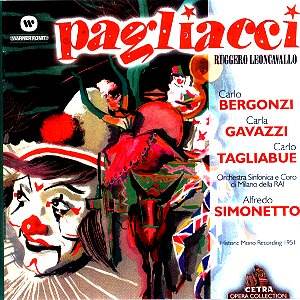Incredibly, the discographies of Bergonzi and of Pagliacci
which I found on the Internet do not list this important document, though
it is an official recording, regularly released on LP in its day.
It has a rather unusual sound for a Cetra recording.
The expected brilliance is there; it is mostly clear if a little shallow,
only the heavier choral moments are uncomfortable. The anomalous feature
is that, in place of the forward positioning of the voices which this
company generally favoured, they are placed well back in the orchestra,
Carlo Tagliabue’s mellow baritone being almost covered at times. But
I must say I was before long so caught up in the performance that I
ceased to notice these defects.
Carlo Bergonzi needs no introduction and many collectors
will have his 1965 performance of this role under Herbert von Karajan.
In 1951 Bergonzi was 27 and he had originally trained as a baritone.
His début was as Schaunard in "La Bohème" in
1947 and his first major role was Figaro in "Il Barbiere di Siviglia"
in 1948. He then withdrew to retrain as a tenor and appeared as Andrea
Chénier in 1951. Italian Radio and Cetra lost no time in signing
him up and I should be interested to know if this was his first recording
as a tenor. He sounds absolutely glorious, revelling in his first fresh
vocal effulgence, and it can be heard that he was a fine artist and
stylist from the very beginning. This is an obligatory purchase for
his many fans.
I have so far reviewed Carla Gavazzi’s performances
as Adriana Lecouvreur and as Donna Elvira in Mozart’s "Don Giovanni".
In my review of the first of these I told what little I know about her.
She is once again remarkable for her total engagement with what she
is singing. In her treatment of vowels (the "brilliant" vowels
are less rounded than we often hear today) and her use of certain expressive
sobs she may seem a singer of yesteryear, but verismo needs the
full treatment if it is to mean anything and this performance reinforces
my impression that we lost a major artist with her early retirement.
Her upper register is ringingly confident; in her middle register she
strengthens her timbre with a fairly wide vibrato and she does not shy
away from chest tones on the lower notes. Put like this you may think
there is some unevenness between the registers but no, her passages
from one to the other are always convincing.
Carlo Tagliabue (1898-1978) made his début in
1922 and was a regular at La Scala from 1930 to 1953. He also appeared
at the Metropolitan and at Covent Garden. He is said to have been a
somewhat stiff actor, but his finely rounded singing is well inside
the part. I can find no information at all about the other two singers,
who acquit themselves well (Di Tommaso) and very well indeed (Rossi).
The unnamed singer of the small comprimario part of the peasant
does a good professional job.
Alfredo Simonetto was also the conductor of the "Adriana
Lecouvreur" set. Once again he paces the music like a true opera
conductor, letting fly when needs be and giving expressive weight to
the slower sections without losing momentum. Above all he gets a lithe
orchestral sound, free of any trace of heaviness. The Milan orchestra
was about a year old at the time and it never did reach the level of
the Turin one (it has now been disbanded); there is some imprecision
but I certainly wasn’t worried by it.
The booklet has an Italian-only text and a brief note
(also in English) which finds space to quote the opinion of René
Leibowitz, of all people, on this opera when some information about
the performance itself would have been much more to the point.
If this had been in state of the art sound it could
have met any competition whatever; the lead singers and the conductor
provide four good reasons for getting it even so.
Christopher Howell

